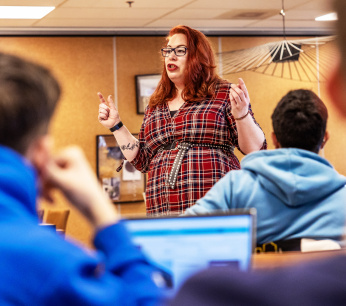Teachers do not see changes in powers
There is little support for drastically changing powers and training teachers, one shows AOb-survey. In November, the Education Council recommended that teacher training courses be overhauled by introducing one broad basis and clustering subjects. 'This will actually increase the teacher shortage,' one respondent wrote in the AOb-survey.

Image: Peter van Dorst / Typetank
"The council thinks that teachers will have a more attractive profession and are more employable with a broad competence," says AObpolicy officer Marieke Jansma. “Our survey clearly shows that teachers think very differently about this. "
Advice
In November 2018, the Education Council, the government's advisory body, published the report 'Make way for teachers'. Out of concern about the increasing teacher shortage, the House of Representatives had asked the Council to investigate how adjustments in the training and work structure of teachers can contribute to sufficient and good teachers. A far-reaching proposal was made in which the advisory body argues for a single broad basis in all teacher training courses, supplemented by a clustering of education sectors and subjects, for example for the young child, or pupils aged ten to fourteen, combined with gamma or beta subjects, so that teachers to be able to work in different educational sectors and to teach several school subjects. The current division of competences for primary, secondary and secondary vocational education is thus abandoned by the council.
AObpolicy officer Marieke Jansma: 'The Education Council believes that teachers will have a more attractive profession and will be more employable with broad competences. Teachers think differently'
Little support
A survey under AObmembers shows that there is little support for the plans. More than 6300 teachers who work in primary, secondary and secondary vocational education completed the questionnaire. Jansma: “Competence and changes in teacher training are, according to the teachers, the wrong buttons to press. They indicate that the profession is becoming more attractive due to fewer teaching hours, a better salary, better management in secondary vocational education and - very importantly - a lower workload.”
For example, a secondary education teacher writes in the survey: 'The pressure is on the class size, the enormous amount of class hours and the many tasks surrounding it, such as supervising when you want to prepare lessons. Those issues must be dealt with first. ' A colleague from primary education also mentions the workload. 'I think that you will eventually get more good teachers, if current teachers are happy and are not overwhelmed by the workload. Satisfied teachers make work more attractive for future teachers. In addition, many part-timers can go back to work full-time, provided that something is done about the workload. '
Primary school teacher: 'I think that eventually you will get more good teachers than the current teachers happy and not be overwhelmed by the pressure of work'
Broad base
Three quarters of the respondents believe that there is no broad pedagogical basis for children aged two to eighteen and older. When it comes to didactics, the teachers are even more definite: 85 percent say that there is no broad didactic basis that is the same for all educational sectors and school subjects. “In the answers, teachers indicate that didactics cannot be viewed separately from subject content and that it differs per age group,” says Jansma.
Teachers are divided on whether teacher training courses will be more interesting with a broad base. For example, 38 percent of teachers in primary education indicate that it makes the training less interesting, 34 percent find it interesting. Kindergarten teachers are especially negative at 52 percent. In group 8, teachers are a lot more enthusiastic to learn about students in different age groups. Jansma: "This interest is understandable, because they also teach students who are in the middle of the age range on which the broad base is aimed."
Three quarters of the respondents believe that there is no broad pedagogical basis for children aged two to eighteen and older
Only a quarter of secondary school teachers find learning about a broad basis in teacher training interesting, especially teachers who work in practical education. Their colleagues in pre-university education have the most objections: 73 percent think it makes the study program less interesting. In secondary vocational education, one in five teachers finds a broad basis in the training interesting.
Clustering
Another important advice from the Education Council is not to train teachers for one subject, but for a cluster of school subjects that are similar. School boards can use teachers more flexibly. 48 percent of secondary school teachers think clustering subjects is undesirable. 42 percent think it is an idea to do this. There are major differences within the education sector. Especially in practical education, teachers are positive with 70 percent. HAVO and VWO teachers value their own subject and only want to teach in it, according to almost 70 percent in the survey.
A secondary education teacher comments: 'From the perspective of the employers, this is a wonderful proposal: they can move around a lot more with lecturers if they can be used for more subjects. The teacher who has chosen a certain field / study based on his interest is not very helpful here. He did not come from pedagogy, but from a professional interest in education. '
HAVO and VWO teachers are committed to their subject and only want to teach in it. 70 percent indicate this in the survey
Clustering subjects means that teachers cannot be deployed as widely in MBO. After all, MBO teachers can work throughout MBO. The survey shows that there is a need to limit this broad employability. More than 60 percent of the respondents in MBO indicate that they only want to teach in the cluster of subjects, courses or professions for which they have been trained.
Specializations
There is disagreement about the specializations in the advice, for example for the young child or for pupils aged ten to fourteen. In secondary education and MBO, teachers now often teach pupils of different educational levels. 60 percent want to keep it that way and see nothing in the 'dividing up' of powers for specific age groups. In primary education, almost everyone, 97 percent, sees the usefulness of a specialization when it comes to teaching in special education. There is much division in this educational sector about the division of competences for young and older children. 45 percent of the respondents in primary education do not see a separate competence for young and old children, 48 percent think it is a good idea.
'If you separate the powers in primary school, this will actually increase the teacher shortage. For example, there will be three lower school teachers at home, while an upper school class will be sent home ', writes a teacher.
Little support
According to AObpolicy officer Jansma, there is little support for drastically changing powers and training teachers. “That is worrying, because it is more important than ever to keep the current teachers. They do not see how these plans make teaching more attractive. The advice seems more like a solution to the organizational problems of school boards, while the starting point should always be: how do you improve the quality of education. Should the plans be further elaborated, then teachers should be fully involved. Teachers are different per educational sector, sometimes per group. ”
Download the entire report of the AObsurvey at this link. De AOb sent a letter to the House of Representatives about its own report. You read the letter here.


